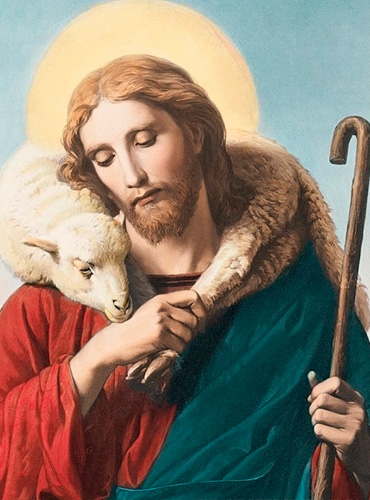Tuesday of the Fourth Week of Easter – Jn 10:22-30
Today’s Gospel presents “the climax of Jesus’ encounters with Jewish authorities” (NABRE commentary): John tells us that this encounter takes place in the winter “on the feast of the Dedication.” Commenting on this, Saint Thomas Aquinas says that John adds the detail “It was winter,” first, to distinguish the feast from others regarding the dedication of the Temple and, second, as Saint Gregory the Great points out, symbolically, it refers to the cold hearts of His listeners. Or, as Saint Augustine says, “The Jews were cold in love, burning in their malevolence.” The Jews ask Him, “Are you the Messiah?,” and Jesus tells them in reply, “The Father and I are one.”
There are two things that we can mediate upon: first, the reaction of the Jews, and, second, our own reaction to Christ and His works. One wonders why the Jews asked in the first place: they would’ve been angry and disappointed if Christ had said no, and when the answer was yes, they still got angry. Saint John Chrysostom puts it this way: “Being able to find no fault with His works, they tried to catch Him in His words. And mark their perversity. When He instructs by His discourse, they say, What sign show You? When He demonstrates by His works, they say, If you are the Christ, tell us plainly. Either way they are determined to oppose Him. There is great malice in that speech, Tell us plainly. He had spoken plainly, when up at the feasts, and had hid nothing. They preface however with flattery: How long do you make us to doubt? as if they were anxious to know the truth, but really only meaning to provoke Him to say something that they might lay hold of.” This is what wickedness and hard hearts are like: rather than trust in God’s goodness, they simply want to accuse. Anything Christ does for them isn’t enough; they just want to blame and attack. Yet, in spite of all of this malice, of which Christ is certainly aware, notice Jesus’ reaction. Rather than get angry, or call for vengeance, he instead explains, and pleads with them to believe. It shows precisely how concerned Christ is with bringing the Jews to salvation.
What does this mean for us? We’re struck by just how merciful Jesus is, and how He tries time and time again to bring others back to the Father. It’s not the time for vengeance and anger, but for mercy. For those who embrace that mercy, and accept that Jesus Christ came to save them, a certain course of action must be followed, and a reward will be given.
Concretely, Aquinas[1] points out that Christ says that His followers do two things for Him, and He, in turn, does two things for them: Christ says “My sheep hear my voice; I know them, and they follow me. I give them eternal life, and they shall never perish.” “The first thing we do is to obey Christ. Concerning this he says, my sheep, [whom I have chosen from all eternity], hear my voice, by believing and obeying my precepts.” In response to this, Christ says “I know them,” meaning, I love and approve of them. “This is like saying: The very fact that they hear me is due to the fact that I know them by an eternal choice.”
Once we have this, we have the second thing we must do: “My sheep follow me.” We must imitate Christ in our lives, at every moment. When we do this, Christ gives us our reward, the fourth point: “I give them eternal life.” This is like saying: They follow me by walking the path of gentleness and innocence in this life, and I will see that afterwards they will follow me by entering into the joys of eternal life.
We must also have great faith in God’s love and protection. Christ tells us: “No one can take [My chosen ones] out of my hand. My Father, who has given them to me, is greater than all, and no one can take them out of the Father’s hand.” To be a sheep in Christ’s flock means being obedient, and living in accord with God’s law. This doesn’t mean that things will always be easy or pleasant. However, it does mean to be protected and safe within God’s hands, to not need to fear anything, since we are in the hands of a loving Father who will not allow us to perish, and will guide us until we reach our heavenly homeland. Today, let us ask, through the intercession of Mary, for the grace to really believe in Christ and in His love for us.
[1] Commentary on the Gospel of John.






